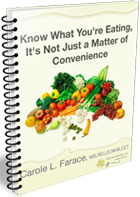VITAMIN K AND ANTICOAGULANT THERAPY
Anticoagulation medication (preventing clots) works by blocking the body’s utilization of vitamin K. Generally, people on the medication are advised to avoid food and supplements that contain vitamin K. Research appearing in Blood (1 November 2004, Vol. 104, No. 9, pp. 2682-2689) looked at the effect vitamin K supplementation had on healthy subjects who were stably taking anticoagulant medication. The subjects were given vitamin K1 supplements, starting with 50 mcg per day for a week and gradually increasing the dosage each week. They found that doses of less than 150 mcg per day had no effect on the drug therapy and that meals containing foods high in vitamin K also had no effect. At doses greater than 150 mcg per day, the “International Normalized Ratio” (INR) would decrease. A reduction in the INR means that the blood is clotting more readily. The authors concluded that eating foods high in vitamin K (like spinach and broccoli) or taking a multiple vitamin that was high in vitamin K, did not interfere with anticoagulant drugs. Other research appearing in Blood (15 March 2007, Vol. 109, No. 6, pp. 2419-2423.) found that patients who were not stable on warfarin treatment (meaning that there was great variation in INR values) tended to be deficient in vitamin K. In the study, patients were given either a placebo or 150 mcg of vitamin K for six months. The group receiving the vitamin K experienced a lower variation in the PNI compared to the placebo group. Of course, those on warfarin therapy should discuss these issues with a doctor and not try to self medicate with supplements.
Source: Biotics Research


Comments